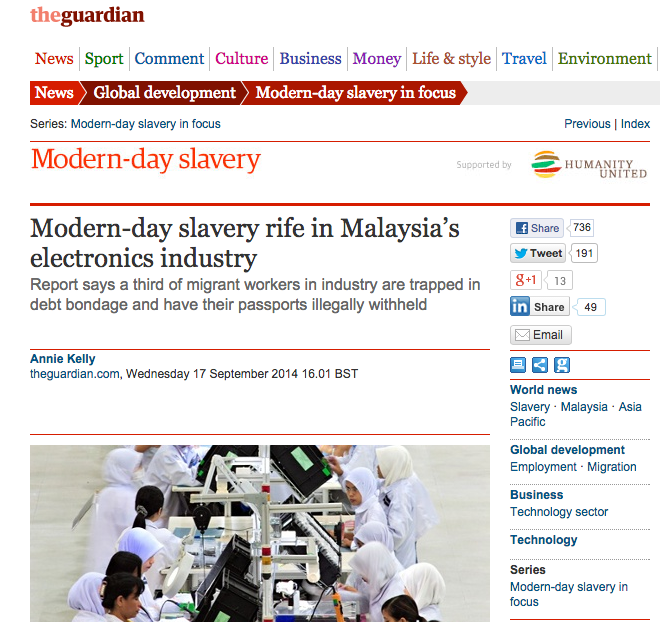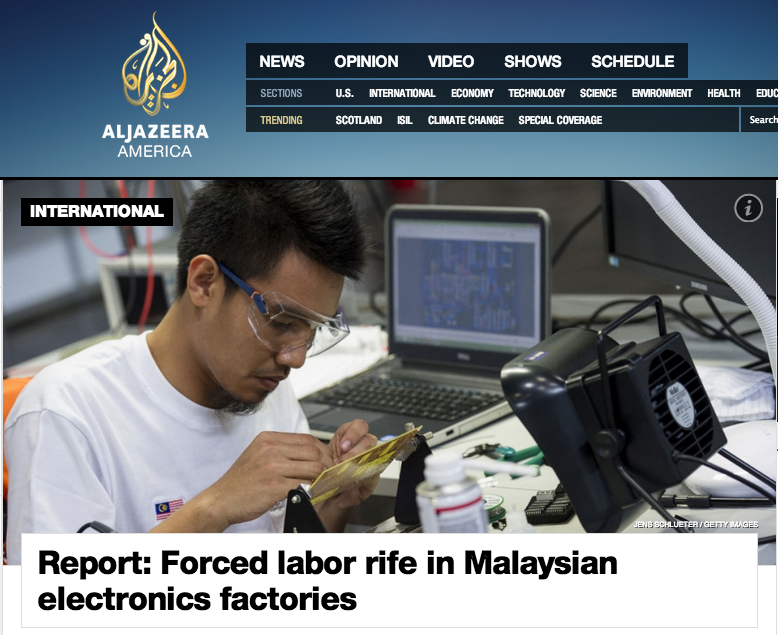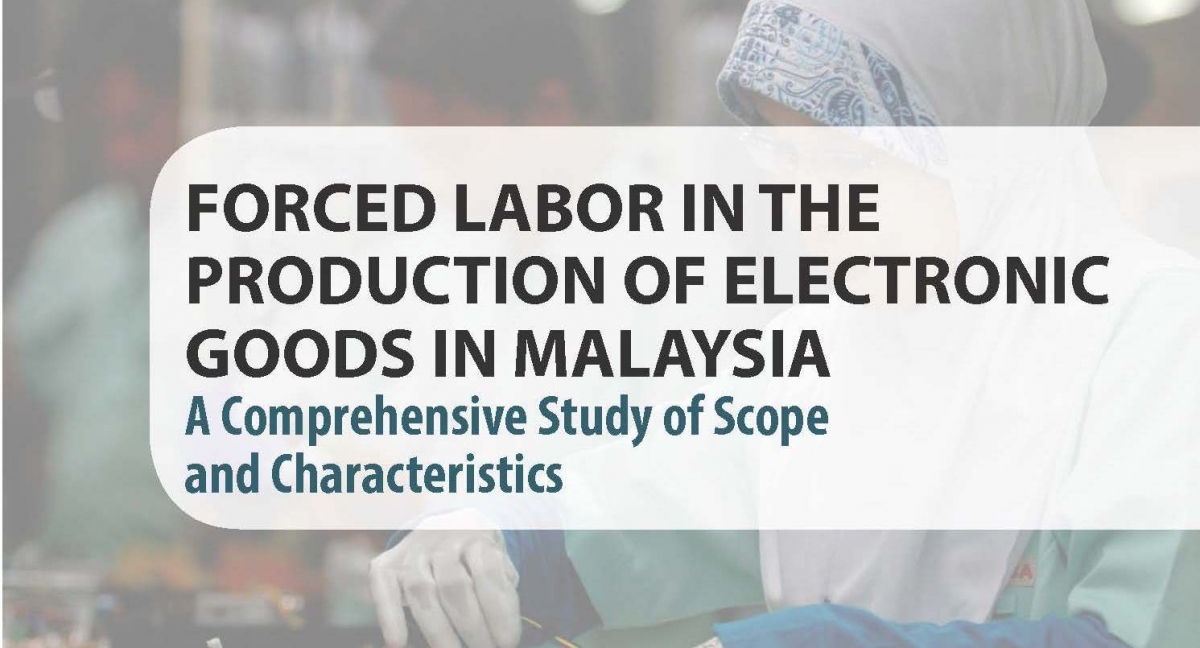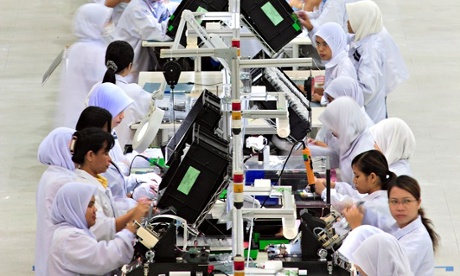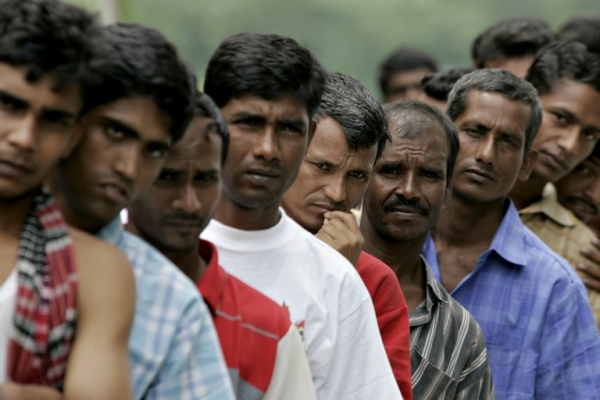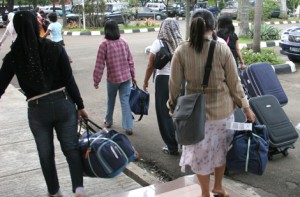Malaysia Gets International Limelight For Modern-Day Slavery In The Electronics Industry
An investigation funded by the United States Department of Labour found that migrant workers in Malaysia's electronic industry works under conditions akin to modern-day slavery.
From the New York Times to Al Jazeera, the international media is rife with reports of modern-day slavery in Malaysia's electronics industry
This follows a report by non-profit group Verité whose invesgation found that one in three migrant worker in the electronic industry here works under forced labour conditions
Verité, a nonprofit organization dedicated to ensuring that people around the world work under safe, fair, and legal conditions, today announced the findings of a first-of-its-kind study on forced labor in the Malaysian electronics industry. The study found that thirty-two percent of foreign migrant workers surveyed, nearly one in three, were working in conditions of forced labor.
Verité interviewed more than 500 male and female workers across all major producing regions, electronics products, and foreign worker nationalities. Malaysian nationals were also surveyed. The results of these extensive interviews indicate that forced labor is present in the Malaysian electronics industry in more than just isolated cases, and that the problem is indeed widespread. This could mean that many electronics products reaching American consumers are produced using forced labor.
This means 32% of nearly 350,000 migrant workers in nearly 200 electronics factories were employed under forced situations. The migrant workers are mostly from Bangladesh, India, Myanmar, Nepal, and Vietnam.
Nearly a third of some 350,000 workers in Malaysia's electronics industry - a crucial link in the international consumer supply chain - suffer from conditions of modern-day slavery such as debt bondage, according to a study funded by the U.S. Department of Labor.
The report said those practices were prevalent among the migrants from Bangladesh, India, Myanmar, Nepal, Vietnam and other countries who work in Malaysia’s nearly 200 electronics factories. Those factories, which produce consumer electronics, motherboards, computer peripherals and other electronic goods, account for a third of Malaysia’s exports and produce for many well-known companies, including Apple, Flextronics, Samsung and Sony.
501 workers were interviewed, of which 92% had paid an exorbitant recruitment fee to secure a job in Malaysia
The report, based on interviews with 501 workers, found that 28 percent of employees were in situations of "forced labor", where work is coerced through factors including indebtedness from excessive fees charged by recruiters.
The Verité report said that 92 percent of the migrant workers in Malaysia’s electronics industry had paid recruitment fees and that 92 percent of that group had paid fees that exceeded legal or industry standards, defined as more than one month’s wages.
On average, workers in the survey were found to have paid 2,985 ringgit ($925) to brokers in their home country and in Malaysia as payment for their passage and jobs. That is more than the average per-capita annual income in Nepal.
Unable to afford the recruitment fee that exceeds legal industry standards, 77% had to take up loans. Half of them spent more than a year repaying the debts.
The report said about half of the migrant workers who borrowed for their recruitment fees spent more than a year paying off those fees. Seventy-seven percent had to borrow money to pay their recruitment fees.
“Workers are paying too much to get their jobs,” Mr. Viederman said. “That leaves them vulnerable to being trapped in their jobs.” “This most modern of industrial sectors is characterized by a form of exploitation that long ago should have been relegated to the past,” said Daniel Viederman, chief executive of Verité. “The problem is not one of a few isolated cases. It is indeed widespread.”
92% were working more than 60 hours overtime a week to pay off their debt. 85% felt it was impossible to leave their job before the debt is cleared.
According to the study, “92 percent reported feeling compelled to work overtime hours to pay off their debt, and 85 percent felt it was impossible to leave their job before paying off their debt.”
One in five immigrants were working more than the suggested 60 hours of overtime a week — the industry's international standard limit — the group said. Malaysian law allows employees to clock up to 72 hours of overtime.
94% of workers had their passport illegally confiscated by their employers, a move which limits their movement. 71% say it would be impossible or difficult to get their passports back when needed.
The interviews revealed that although it is illegal under Malaysian law, more than 90% of workers had their passports taken by managers at their place of work or by recruitment agents, with most saying they were unable to get them back.
According to the report, 94 percent of the migrants did not have their passports when Verité's investigators interviewed them, and 71 percent said it would be impossible or difficult to get their passports back when needed. The Verité report found 62 percent of migrant workers said they were unable to move around freely without their passports.
Some firms were found to charge more than $1,000 for a worker to "borrow" his or her own passport.
Once the workers arrive at their workplace, they often face further exploition, abuse, and are housed in dire living conditions
Once in the workplace, migrant workers face further exploitation and abuse due to their inability to leave.
The report found that 30 percent of foreign workers said they slept in a room with more than eight people, and 43 percent said there was no place where they could safely store their belongings. Twenty-two percent of the workers said they had been deceived about their wages, hours or overtime requirements during the recruitment process.
Verité’s investigations found that workers were forced to live in cramped and dangerous accommodation, that female workers experienced sexual abuse by their supervisors, and migrants were forced to work excessive overtime under the threat of losing their jobs, which would leave them saddled with large debts they couldn’t pay off.
Quitting and returning home is not an option as they would be imposed a heavy fine on top of their debts. There is also the problem of getting their passports back.
Fifty-seven percent said they could not leave their job before their contract was finished because they would be charged an illegally high fine, lose their passport or be denounced to the authorities.
Daniel Viederman, chief executive of Verité told of a migrant worker from Nepal who spoke good English and was the only one of five children with a college degree. His family paid a recruitment agent $1,500 for his job, which was more than twice the annual income in Nepal, and they borrowed much of that at a 36 percent annual interest rate.
When the Nepali arrived in Malaysia, his passport was taken from him at the airport, and he has not seen it since, he told the Verité interviewer. “He has now completed 14 months of a three-year contract, and he has not been able to save any money” because he is still paying back the recruitment fees, Mr. Viederman said. The Nepali works 12 hours a day, often seven days a week, and said it would take two years to finish repaying the loan.
“He doesn’t want to be in Malaysia anymore,” Mr. Viederman said. “He wants to quit and return home, but then he would have to pay a hefty fine and purchase his own plane ticket and still have the loan payment hanging over his head. He wasn’t sure if he could get his passport back.”
Multinational companies such as Samsung, Apple, and Bosch use Malaysia as their manufacturing base
A large number of multinational companies from the US, Europe, Japan, Taiwan and South Korea use Malaysia as their manufacturing base. In 2013, more than $2.6bn (£1.6bn) of investment originated from overseas.
Several U.S., European, Japanese and South Korean multinationals have operations in Malaysia, including Samsung Electronics Co Ltd, Sony Corp, Advanced Micro Devices, Intel, and Bosch Ltd BOSH.NE. Some big brands use suppliers such as Flextronics FLEX.UL, Venture Corporation, Jabil Circuit (JBL.N), and JCY International to make parts for smartphones, computers and printers.
“What was most shocking to us was that this was happening in modern facilities, some of which were owned and operated by major international brands,” said Dan Viederman, chief executive of Verité. “This work has led us to conclude that forced labour in this industry is systemic and that every company operating in this sector in Malaysia faces a high risk of forced labour in their operations.”
Verité says the electronics industry is prone to such human rights abuse due to its widespread reliance on third-party agents for recruitment of foreign workers
The report identified the top factors responsible for making this sector prone to human rights abuses. According to Verité's study, the widespread reliance on third-party agents for the recruitment, management and employment of foreign workers limits their protections and blurs accountability for labor conditions.
Other top factors identified by the research as contributors to forced labor include: unlawful passport retention, high and hidden recruitment fees resulting in widespread indebtedness that can trap workers in their jobs, deceptive recruitment practices, highly constrained freedom of movement, poor living conditions, fines and other penalties that prevent workers from being able to resign, and inadequate legal protections.
This investigation was funded by the US Labour Department as they frown upon the importation of goods made by forced labour
The U.S. government funding adds credibility to a report which is likely to come as a surprise to many consumers.
Labor Department officials commissioned the study because the federal government frowns on the importation of goods made by forced labor. They sought an investigation after seeing evidence that the problem was serious in Malaysia.

